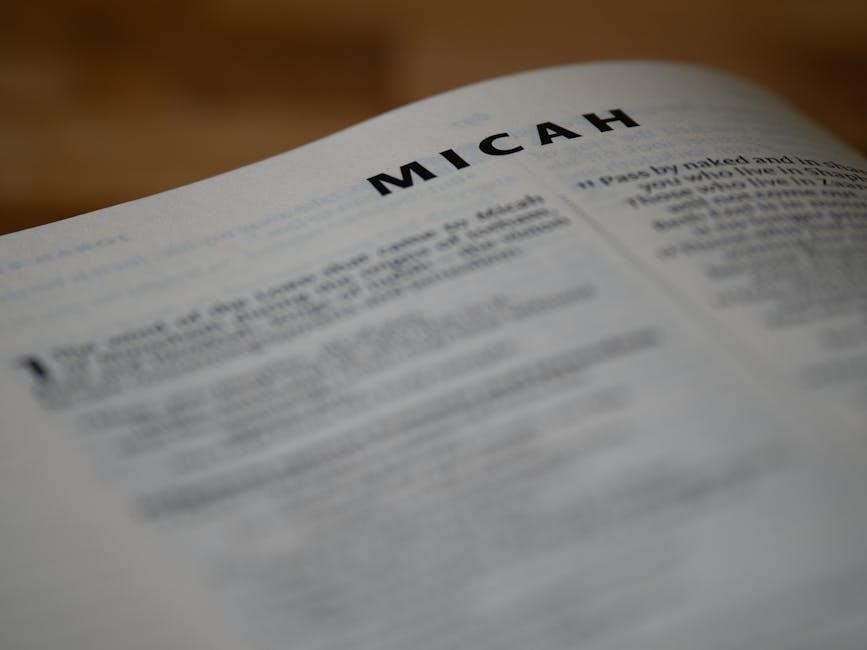Examining the 12 types of prophets provides a comprehensive understanding of their roles in religious contexts, emphasizing their messages of redemption, justice, and spiritual guidance and their enduring influence on faith communities.
Overview of Prophets in Religious Contexts
Prophets play a central role in religious traditions, serving as messengers of divine will and moral guidance. Across various faiths, prophets are recognized for their ability to convey spiritual truths, call communities to repentance, and foresee future events. Their messages often emphasize justice, mercy, and redemption, shaping the theological and ethical foundations of their respective religions. From major figures like Isaiah and Jeremiah to lesser-known voices, prophets are celebrated for their courage and dedication to God’s mission. Their teachings continue to inspire and guide believers, offering timeless wisdom in a changing world. Understanding their roles and messages is essential for grasping the depth of religious thought and practice.
Significance of Understanding Prophet Types

Understanding the 12 types of prophets offers profound insights into their diverse roles and messages, enabling a deeper appreciation of religious texts and traditions. By distinguishing between major and minor prophets, as well as false prophets, believers gain clarity on God’s plan and divine justice. This knowledge helps identify genuine prophetic voices and discern their purpose in guiding humanity. It also fosters a stronger connection to spiritual teachings, encouraging personal reflection and growth. In today’s world, recognizing these prophetic roles can inspire individuals to align their lives with moral and ethical principles, reinforcing faith and providing guidance for navigating life’s challenges.
The Major Prophets
Isaiah, Jeremiah, Ezekiel, and Daniel are prominent figures known for their profound visions and messages of redemption, judgment, and hope, shaping theological foundations across generations.
Isaiah: The Prophet of Hope and Redemption
Isaiah, a pivotal figure in religious texts, is renowned for his profound visions of hope and redemption. His prophecies emphasize the coming Messiah and divine restoration, offering comfort to the oppressed. Isaiah’s messages highlight God’s justice, mercy, and ultimate plan for humanity, blending warnings of judgment with promises of salvation. His writings are celebrated for their poetic depth and theological richness, inspiring faith communities across generations. Isaiah’s legacy endures as a beacon of hope, reminding believers of God’s enduring love and the possibility of redemption, even in the darkest times. His influence extends beyond religious circles, shaping cultural and ethical frameworks worldwide.

Jeremiah: The Prophet of Lamentations and Calls to Repentance
Jeremiah, known as the Prophet of Lamentations, delivered heartfelt calls to repentance, urging Israel to return to God amidst impending judgment. His prophecies emphasized moral decay and the consequences of disobedience, often expressed through emotional appeals and vivid imagery. Jeremiah’s message centered on the broken covenant and the need for spiritual renewal. His writings, including the Book of Lamentations, reflect his deep sorrow over Jerusalem’s destruction. Despite facing persecution, Jeremiah remained steadfast, offering a message of hope for restoration after judgment. His legacy underscores the importance of faithfulness and the enduring relevance of his warnings in guiding spiritual reflection and moral accountability across generations.
Ezekiel: The Prophet of Visions and Divine Judgment
Ezekiel, a priest turned prophet, is renowned for his vivid visions and messages of divine judgment. Exiled in Babylon, he received visions of God’s glory, such as the “wheel within a wheel,” symbolizing God’s omnipresence and judgment. Ezekiel’s prophecies often focused on Israel’s moral corruption and the impending destruction of Jerusalem. His famous “valley of dry bones” vision symbolized Israel’s restoration. Ezekiel’s role was to call people to repentance, warning of divine judgment while offering hope for renewal. His prophetic ministry emphasized God’s sovereignty and justice, blending dramatic imagery with a call to faithfulness, leaving a lasting impact on theological understanding and spiritual reflection.
Daniel: The Prophet of Apocalyptic Visions
Daniel, a prophet exiled in Babylon, is renowned for his apocalyptic visions and interpretations of divine mysteries. His prophetic ministry included visions of four beasts, symbolizing world empires, and the “70 weeks” prophecy, foretelling Israel’s restoration. Daniel’s visions often focused on the rise and fall of nations, emphasizing God’s ultimate sovereignty. His ability to interpret dreams and visions, such as Nebuchadnezzar’s statue, showcased divine wisdom. Daniel’s prophecies are deeply eschatological, offering glimpses of the end times and the Messiah’s arrival. His writings are a cornerstone of apocalyptic literature, inspiring hope and perseverance among believers, while his legacy continues to influence prophetic interpretations in religious traditions.
The Minor Prophets
The Minor Prophets, comprising twelve books, emphasize divine love, justice, and repentance, offering profound spiritual insights and calls to moral accountability across their diverse messages.
Hosea: The Prophet of Divine Love and Mercy
Hosea, a Minor Prophet, is renowned for his profound emphasis on divine love and mercy. His prophecy, set against a backdrop of Israel’s rebellion, uses his marriage to Gomer, a symbol of Israel’s unfaithfulness, to illustrate God’s enduring compassion. Hosea’s central message calls for repentance, urging Israel to return to the Lord with sincerity. While his prophecies include harsh judgments, they are always tempered with promises of restoration, reflecting God’s merciful nature. His unique approach balances judgment with redemption, offering hope for reconciliation and renewal. Hosea’s teachings continue to inspire moral and spiritual awakening, making his prophecies timeless and universally relevant.

Joel: The Prophet of the Day of the Lord
Joel, a Minor Prophet, is prominently known for his vivid depiction of the Day of the Lord, a time of divine judgment and redemption. His prophecy emphasizes the inevitability of this event, urging repentance and spiritual preparedness. Joel calls the people to return to the Lord with sincerity, warning of impending calamities such as locust invasions and cosmic disturbances. Despite the severity of his warnings, Joel’s message also offers hope, promising the outpouring of the Holy Spirit and eventual restoration. His prophecies are deeply eschatological, linking God’s judgment with ultimate redemption, making his teachings foundational for understanding divine justice and mercy;
Amos: The Prophet of Social Justice
Amos, a Minor Prophet, is renowned for his impassioned calls for social justice and equity. Originating from Tekoa, he was not a professional prophet but a shepherd, emphasizing his humble beginnings. His prophecies condemned the exploitation of the poor by the wealthy and powerful, urging Israel to uphold moral integrity. Amos famously declared, “Let justice roll down like waters,” highlighting God’s demand for fairness. He criticized religious hypocrisy, warning of divine judgment if societal injustices persisted. His message remains timeless, advocating for compassion and righteousness in all spheres of life. Amos’s teachings underscore the divine expectation of ethical living and accountability.
Obadiah: The Prophet of Divine Judgment on Nations
Obadiah, one of the Minor Prophets, is known for his prophecy focused on divine judgment, particularly against the nations surrounding Israel. His message emphasizes God’s sovereignty and justice, warning of impending judgment for those who oppress Israel. Obadiah specifically condemns Edom for its betrayal and arrogance, prophesying its downfall. His prophecies also include a vision of Israel’s ultimate redemption and restoration. Obadiah’s teachings highlight the consequences of sin and the importance of faithfulness to God. His concise yet powerful message underscores the universal nature of divine justice, making him a significant figure in understanding prophetic themes of judgment and redemption.

The Prophets of the New Testament
This section explores the prophetic figures in the New Testament, focusing on John the Baptist and Jesus Christ, who fulfilled ancient prophecies and ushered in a new covenant of redemption.
John the Baptist: The Prophet of Preparation
John the Baptist is recognized as a pivotal prophet in the New Testament, tasked with preparing humanity for the arrival of Jesus Christ; His ministry emphasized repentance, baptism, and moral reform, calling people to turn away from sin and seek spiritual renewal. Often referred to as the “voice in the wilderness,” John’s role was to pave the way for the Messiah, fulfilling ancient prophecies. He baptized Jesus, an act that marked the beginning of Christ’s public ministry. John’s teachings stressed humility, justice, and faith, setting the stage for the redemption brought by Jesus. His prophetic mission remains a cornerstone of Christian theology, highlighting the importance of preparation and spiritual readiness.

Jesus Christ: The Prophet of Redemption
Jesus Christ is often regarded as the ultimate Prophet of Redemption, embodying the fulfillment of divine promises. His teachings emphasized love, forgiveness, and salvation, offering humanity a path to reconciliation with God. Through His life, death, and resurrection, Jesus provided the ultimate act of redemption, freeing humanity from sin. His ministry was marked by miracles, parables, and a profound call to spiritual transformation. As a prophet, Jesus not only foretold future events but also revealed God’s heart of love and mercy. His message transcends time, inspiring faith and guiding believers toward eternal life. Jesus’ role as the Prophet of Redemption remains central to Christian theology and devotion.

The False Prophet

The False Prophet is a figure often depicted in religious texts as a deceiver opposing divine truth, leading people away from God through deceit and corruption.
Characteristics of the False Prophet in Religious Texts
The False Prophet is often depicted as a deceptive figure who opposes divine truth, misleading people through false teachings and counterfeit miracles. In religious texts, this figure is associated with corruption, manipulation, and a rejection of God’s authority. They are known for their ability to perform signs and wonders that mimic divine power, aiming to lead people astray. The False Prophet often works in conjunction with other antagonistic figures, such as the Antichrist, to undermine true faith. Their teachings are self-serving and contradict the principles of justice and righteousness. Despite their charisma, their ultimate goal is to divert humanity from the path of salvation, embodying spiritual deception and moral decay.

The Prophet in Modern Contexts
Modern prophets often emerge as voices of change, addressing contemporary societal issues while drawing inspiration from ancient teachings, blending tradition with innovation to relevance today.
Contemporary Interpretations of Prophetic Roles
In modern contexts, prophetic roles are reinterpreted to address contemporary societal challenges, such as social justice, environmental sustainability, and technological ethics. Many view prophets as figures who bridge tradition and innovation, offering guidance that resonates with today’s global issues. The concept of prophecy has evolved, with some emphasizing its adaptability across cultures and faiths. Modern prophets often inspire personal and communal transformation, urging individuals to reflect on their values and actions. This interpretation highlights the timeless relevance of prophetic messages, even as their delivery and context change. The role of the prophet remains a powerful symbol of hope, critique, and spiritual renewal.
The exploration of the 12 types of prophets reveals their profound impact on faith and society, emphasizing themes of hope, redemption, justice, and divine judgment across centuries.
The 12 types of prophets, spanning major, minor, and New Testament figures, encompass a diverse range of roles and messages. Major prophets like Isaiah, Jeremiah, Ezekiel, and Daniel delivered profound truths, from hope and redemption to apocalyptic visions. Minor prophets such as Hosea, Joel, Amos, and Obadiah emphasized divine love, justice, and judgment. New Testament figures like John the Baptist and Jesus Christ introduced a new covenant of redemption. The false prophet, often linked to deception, contrasts sharply with genuine prophetic callings. Together, these prophets provide a rich tapestry of spiritual guidance, highlighting themes of redemption, justice, and divine purpose. Their teachings remain influential, shaping faith and ethical living across generations.
Final Thoughts on the Relevance of Prophets Today
Prophets, across their diverse types and eras, continue to hold profound relevance in modern times. Their timeless messages of hope, justice, and redemption inspire individuals and communities to reflect on their values and actions. In an age grappling with uncertainty and moral ambiguity, the teachings of prophets offer guidance, encouraging compassion, integrity, and faith. Their legacies remind us of the importance of standing for truth and advocating for the oppressed. Whether in religious or secular contexts, the prophetic call to seek a higher purpose resonates deeply, reminding humanity of its potential for transformation and the enduring power of divine wisdom.